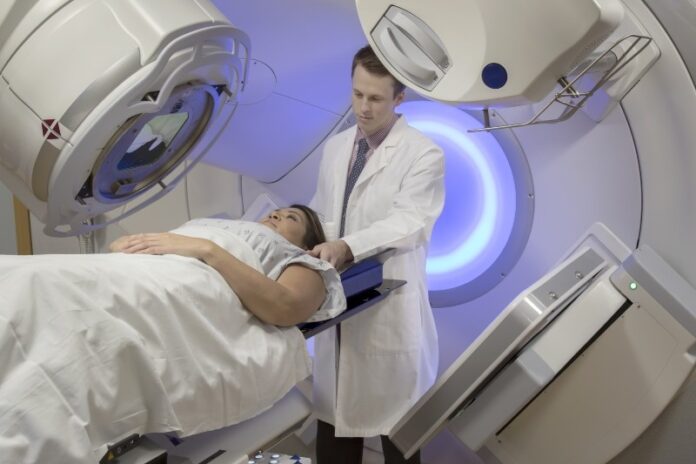
When you hear the word “cancer,” you immediately start to consider what your treatment options may be. Two of the most common treatments are chemotherapy and radiation, also called radiotherapy, radiation therapy or radiation treatment. You’ve heard these terms. You’ve probably even asked people diagnosed with cancer if they’re undergoing these treatments. Or you’ve asked your own doctor in the case of a personal diagnosis. But do you understand radiation?
If not, you’re in good company. It’s okay to take a couple of moments to read the basics and become better informed.
Only your doctor can analyze your personal diagnosis and decide
if radiation therapy is an appropriate treatment option.
Radiation Basics
In its simplest definition, radiation therapy is intense energy sent to damage and destroy cancer cells. Radiation can use high doses of x-rays, protons or other waves of energy. These are sent in targeted, localized and strategic places to maximize the attack on cancer cells and minimize the impact on healthy cells surrounding the cancer.
Using external beams is the most common form of radiation. But internal (still targeted) radiation can also be used. Radiotherapy creates small breaks in the DNA of the cancer cells, causing the cancer cells to be unable to divide and eventually die.
While healthy cells may be affected, they usually recover and go back to functioning the way they should.
Why Use Radiation
Radiation can be used to eliminate cancer all by itself or may be used with other cancer treatments such as chemotherapy or surgery. In some cases, radiation therapy is used before surgery. This can cause a tumor to shrink to a manageable size so that it can be removed completely or almost completely during surgery.
It may also be used after surgery, as kind of a clean-up method. If your doctor thinks he has removed the entire mass, radiation treatment may be administered to eliminate any stray cancer cells. This could also reduce or prevent a recurrence of cancer if small individual cells are in other parts of the body, away from the primary occurrence.
Radiation is also used in palliative care to relieve symptoms even if the cancer itself cannot be eradicated. This may shrink the tumor and relieve pain or alleviate complications such as trouble swallowing, breathing or using the bathroom.
Radiation Side Effects and Risks
Like most treatments, radiation treatment is not without risks. Many of the side effects resolve when treatment is over, although some may be long lasting or not show up until months or years after the treatment is completed. Possible risks and side effects include:
- Hair loss
- Nausea
- Fatigue
- Skin changes
- Fertility problems
- Sexual problems
- Diarrhea
- Urinary and bladder changes
- Edema
Talk to your doctor about the risks and side effects to decide if radiation treatment is right for you.
Education and Support
Whether you are considering your treatment options, currently undergoing radiation therapy, or have completed radiation, the compassionate team at Pretty in Pink Boutique will walk with you and your loved ones through this journey. We will answer questions as we can, work with your insurance company for headwear or compression garments, and simply be there for you. Contact us at 615-777-7465 or email us at [email protected] to schedule your appointment.
Pretty in Pink Boutique Locations & Contact
Maplewood Office Park
400 Sugartree Ln Ste 400
Franklin TN
Phone: (615) 791-8767
Vanderbilt 100 Oaks
719 Thompson Ln Ste 25010
Nashville TN
Phone: (615) 866-4102
Northpoint Office Park
2231 NW Broad St Ste C
Murfreesboro TN
Phone: (615) 866-4555
Hendersonville
131 Indian Lake Rd Ste 213
Hendersonville TN
Phone: (615) 866-4547















